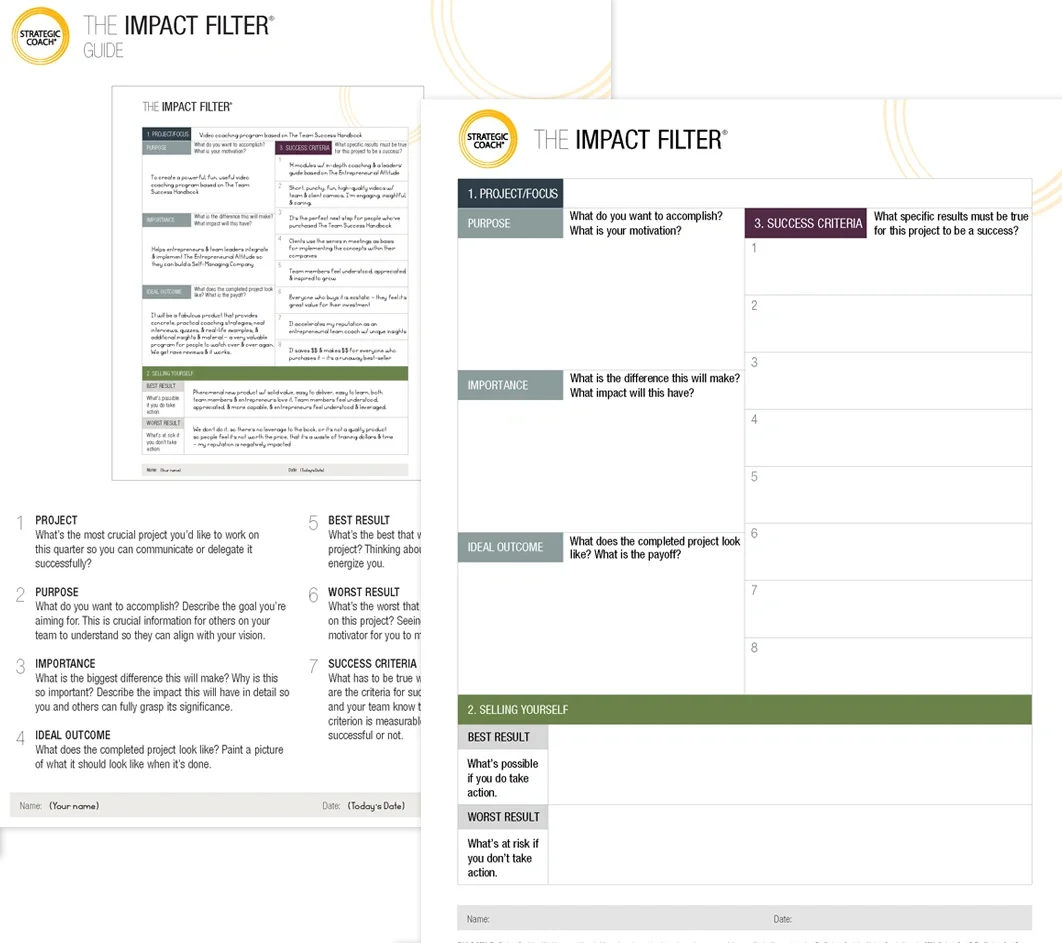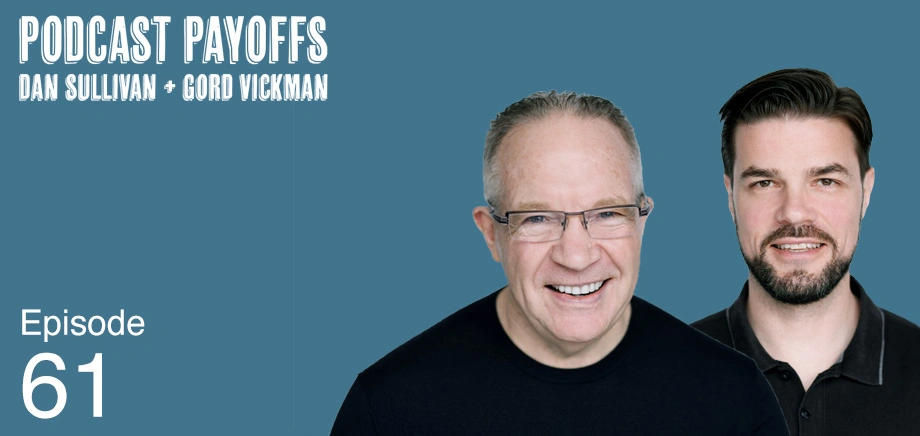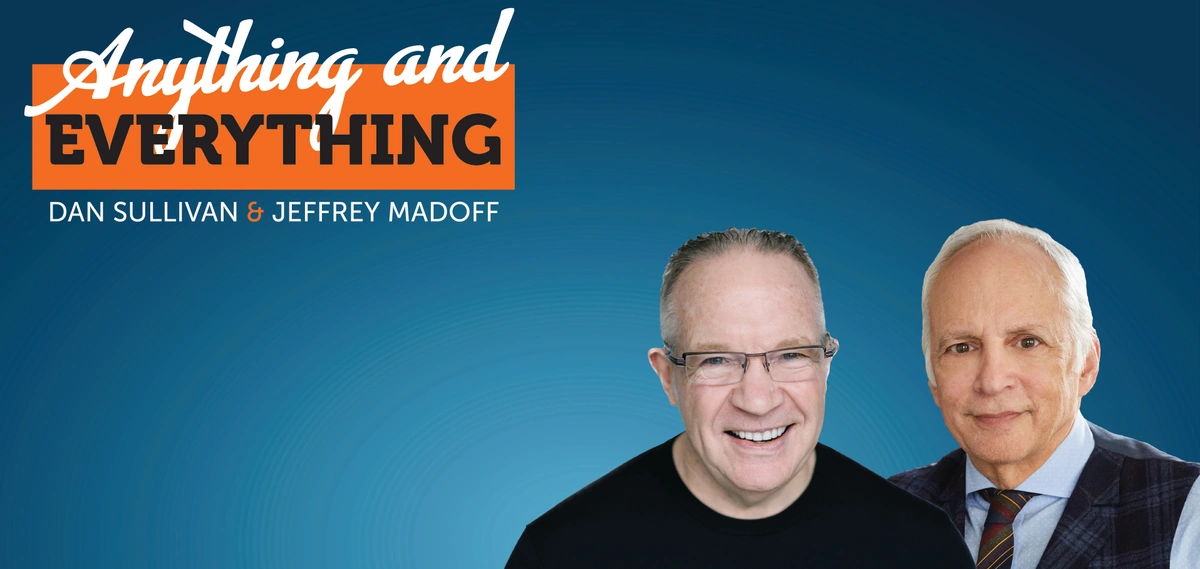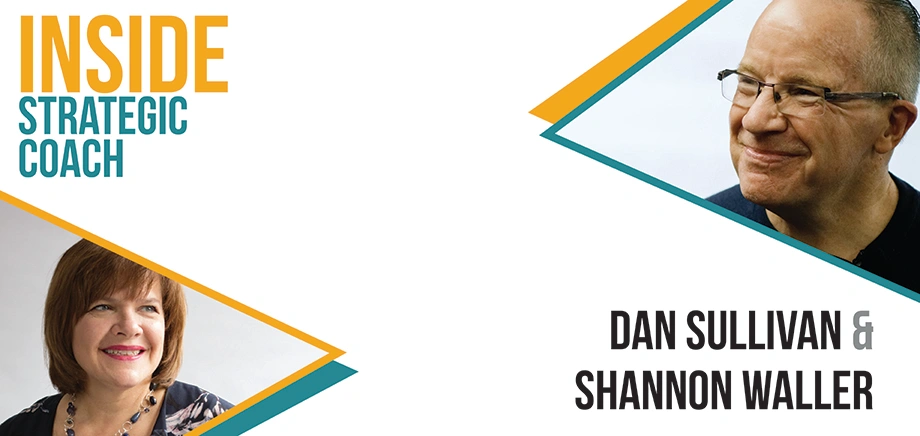The Four-Step Process For All Human Progress
January 22, 2025
Hosted By
 Dan Sullivan
Dan Sullivan
 Gord Vickman
Gord Vickman
Do you believe confidence is a prerequisite for success, or could it be the reward for taking bold action? In this episode, Gord Vickman and Dan Sullivan discuss The 4 C’s Formula®, a four-step process of commitment, courage, capability, and confidence, and share how to embrace fear and uncertainty as essential steps toward growth. What happens if you outsource one or more to technology?
Show Notes:
- High achievers commit to action before feeling confident. Others wait for confidence to act.
- Commitment means pushing through challenges to develop new capabilities.
- New capabilities always lead to increased confidence.
- When you gain confidence, you can restart the 4 C's process at a higher level.
- With greater confidence, you can make bigger commitments.
- Building new capabilities on top of existing ones compounds your confidence.
- AI is now an option to skip steps, but will that damage the process?
- Growth stops when you stop developing new capabilities.
- All genuine capabilities must be earned, and true confidence follows capability development.
- Our 21st-century progress is built on the capabilities developed by countless predecessors.
- Confidence feels good. Courage feels scary.
- Courage is necessary when you lack capability.
- Once developed, a capability becomes a permanent asset.
- Whether consciously or not, all achievers have used The 4 C's Formula.
Resources:
The 4 C’s Formula by Dan Sullivan
Casting Not Hiring by Dan Sullivan and Jeffrey Madoff
Who Not How by Dan Sullivan and Dr. Benjamin Hardy
Learn more about author Ryan Holiday
Episode Transcript
Gord Vickman: Welcome to the next episode of Podcast Payoffs. Gord Vickman here with Dan Sullivan. As always, Dan, welcome to the show. Always a pleasure to have you here. Thank you, Gord. We titled this one Pump the Brakes: Outsourcing a C in the Human Experience. What does that mean? What is the letter C? We're being mystical and cagey here. But there's a concept that we have in Strategic Coach. It's a 4 C's Formula. I won't steal your thunder by saying what they are, Dan, for those who may not be familiar with it. But it's an older concept, but there's a reason why we're going back to it. And it's going to involve AI and new capabilities. So, Dan, let's kick off because we want to make sure that you are familiar with the 4 C’s, where it came from, where the concept came from, when did you come up with this? And then we'll get into the new capabilities later and why it makes sense right now.
Dan Sullivan: Yeah. Well, first of all, I'll just start off by saying what the 4 C's are. So there's four words. They start with C. The first one is commitment. The second one is courage. The third one is capability. And the fourth one is confidence. Those four things really determine whether you're successful or not successful, whether you achieve or you're a non-achiever, whether you feel good about your progress or you don't feel good about your progress. And this is the way it is that what I've noticed is that a lot of people, even though they go through good education, they might have really, you know, really good parenting when they're young, and they go off to college and they get a college degree. And then afterwards, they don't do anything. I mean, they do enough to make a living, but they don't actually create anything. They don't make anything bigger independently. They just do what they're told. And it has to do with how they look at the 4 C's.
So what I would say that non-achieving people have a condition that's necessary before they'll even attempt to do anything. And that is that they have to be confident before they'll attempt anything. And I say, no, actually, in the 4 C’s, confidence is number four. And confidence is a reward for doing other things. And then when you do the other things, you get confidence as a reward. And then they'll come back and they'll say, well, what I mean is that I'll do it when I have the capability. And I say, no, capability is number three in the 4 C's, and that when you actually achieve a new capability, then you get confidence as a reward. But there's two other things that you have to do before you get the capability and confidence. So I said the first thing you have to do is that you have to commit that you're going to gain a new capability in the future. And they say, well, yeah, but don't I need capability and confidence to commit? And I said, no, you just have to commit and say, okay, I'm going to go towards this. What the commitment basically says, doesn't matter what I have to go through, I'm going to go through it in order to get to capability. And they say, that sounds scary. And I said, yes.
And that's why the second C is courage. You have to be courageous. And they said, well, what's the difference between courage and confidence? I said, confidence feels really good. Courage doesn't feel real good. Courage is scary. We admire it in other people. And they say, gee, look how confident they weren't. They weren't confident. They were courageous. They were just going until they actually developed the new capability. And my feeling is that there's actually a mathematical formula here. It's actually an emotional formula, but it's sort of mathematical. That when you make a commitment and you actually go through courage, it's sort of a multiplier. It's actually commitment times courage, and that creates a new capability. Which means that the capability did not exist before you created it, but once you have it, then it's yours forever.
And as I said before, when you actually create a new capability, then you get confidence. And what that allows you to do is to start the whole process over again. So with higher confidence, you can make an even bigger commitment, go through another stage of courage, create another capability. And then stack that capability on to the previous capability, and that gives you even more confidence. And then you sort of rinse, re-lather, wash your hair, and repeat. But it's a cycle. So that's what I really think. And that really comes from 50 years of coaching entrepreneurs. So my job as a coach of entrepreneurs is just to remind people, are you really, really committed to something right now or are you just coasting on the basis of previous capabilities that you've developed and thinking, well, I've got enough capabilities now, I can take on anything. And I said, well, you won't go any higher, you won't go any further. You'll just stay where you are.
Gord Vickman: So what's your personal connection to this? You had to figure it out for yourself because you created this. But obviously, like when I look at this, I'm thinking, okay, most people are doing this backwards because confidence is the last one that would be built based on the first three satisfaction of the first three C's. Most people would think, okay, well, I need to be confident and then I need to learn everything. So I need the capability. And then I'm going to, maybe I'll be courageous enough to do this. And then once I have all that, then damn it. I'm going to do this. It's completely backwards, but you figured it out how to flip it around. So I suspect there was a personal anecdote.
Dan Sullivan: I'm very prone to action. I'm very prone to moving forward. And I don't feel happy with myself when I'm not moving forward. And I began to realize that somehow in my mind I was saying, Gord, that I don't really have the capability and confidence to do this yet. And I said, yeah, but when are you going to get it? I mean, how do you get it? And I just began exploring that it had to be a commitment. You had to picture something in your mind in the future of you operating at a much more capable level. And then I realized I just had to move forward as if I had the capability before I had the capability. And that's scary. That's really scary. So I've been at the coaching, you know, the whole coaching of entrepreneurs, I started that in 1974, and I didn't know what I was doing. I didn't really have any obvious skills for doing this, except I'm a good listener and I'm good at asking questions.
Okay, but to go back and answer your question in another way, Gord, I'd like to go back. I think everybody has done this actually, you know, who's progressed in life and actually had, you know, achievements in life. I think they've done this dozens and dozens of times, they just didn't have a structure for understand what they were doing. So what I try to do is to create real formulas that the reason why you're successful is you've been following this formula. So it's easier to teach someone a new structure or a new process when you show them that they've already done it. Okay, that way they say, oh, yeah, I remember how I did that. Wasn't it scary for a while when you did it? Oh, yeah, I was really scared. And I said, well, that's actually an official part. Courage is actually an official part. And what that allows them to do is to actually say, oh, so I shouldn't freak out when I'm feeling scared. And I said, no, no, it's necessary. That period of feeling scared is actually very, very necessary. You have to do that. Then you get a new capability.
I said, new capabilities don't come free. New capabilities are not cheap. You know, you have to do some real investment. You have to really commit yourself to get a new capability. And that really makes them feel a lot better. So whenever someone comes to me, for example, they feel stuck or they feel confused, I say, so let's just go through the 4 C's here and check out where you are, and say, so what's the commitment here? And right off the bat, you can see they're not clear at all what it is that they're trying to achieve. So I ask them some more questions. They get clearer. And I says, do you have enough clarity about what you're going to move forward now? And they say, yeah, but it's going to be scary. So how many days of scary would you give yourself to get to the new capability? And they said, I don't know.
Well, let me say this. If you put in four days of being scared, but remembering what the commitment is, do you think you'll be better off by Friday? Do you think Friday will be better? And I said, could you be scared until Friday? And they said, yeah, yeah, I could be scared until Friday. Not Saturday, you don't want to go. No, no. It's a weekend. Right. You just don't want to take it into the weekend, you know, and everything like that. But what you're doing is that you're getting them just to focus their energies. But if you tell them, you know, this goes back to the beginning of humanity. This is how humans have always made their way forward. And so they've always gotten better at things. They've found the 4 C's. This is ancient wisdom.
Gord Vickman: That's a good segue. It's an older concept. So you might be wondering why are we talking about an older concept? Are you run out of things to talk about? By the way, if you're intrigued by the 4 C's, go to strategiccoach.com, click store and the quarterly book, it's got a blue title. You can get the 4 C's book there and download it, read it yourself. So, why are we talking about an older concept? Because I was thinking about this and I thought to myself, Dan, you know what? When you created this and you wrote the mini book and you were figuring it out in your mind and making it concrete, did you suspect at that point, I suspect you didn't, but you can correct me if I'm wrong, that something would come along years later called AI, which would allow people to outsource one or more of these? Was that any kind of consideration at the time or was it always going to be you know, full human horsepower?
Dan Sullivan: Well, first of all, I can reverse the question. I say, based on the fact that it's always going to require my movement into the future, then I got to get really good at this 4 C’s thing because it's always going to be required for me to move forward. And then, of course, it wasn't just AI. You know, I mean, I started the coaching career in 1974 because that was six years before personal computers. You didn't even have personal computers. And then all the add-ons with personal computers, graphic user interface, which made computers really easy. And then software, which made it really, didn't have to do floppy disks. You didn't have to store on floppy disks. It was built right into your computer. And then the internet came along and email came along and you know, all the other software programs, immense storage with the cloud, you know, you could get immense storage.
And so you're always adjusting, you know, and my sense is that this is a forever game, you know. 20 years from now, there'll be new things that are related to this whole digital capability, which has been huge. And it's really been really quite extraordinary what's happened in the last 40, 50 years with this stuff. But AI is another, I think, there's what I call continuous changes, where you can see that if we just go to the next stage of development, something's going to be really great. But I think AI, when ChatGPT, OpenAI, came out in November 30th, I think it was, of 2022, that seemed to be a discontinuous jump. I mean, computers themselves were a discontinuous jump, personal computers. In 1978, you didn't have computers. 1981, a lot of people were using personal computers. So something abrupt happened over that three-year period. And then graphic user interfaces, it just went worldwide.
So AI, I think, is one of those things. The way I'm approaching it is I've got some big book projects. I have my quarterly books, which we're okay with. We've got all the capabilities we need to do our quarterly projects. But now we have another big major market book with Hay House Publishers called Casting Not Hiring. So what I've done with this, Gordon, you'll be interested in this, Alex Varley, who's one of our team members, moved to Great Britain. So I've cast him in the role of being my book AI transformer. And that is, he's going to find every single AI tool that I can use to make the writing of a book faster, easier, and getting better results. Right now, that's a commitment. So to use the 4 C's model, I'm in the commitment stage that I'm going to commit to absolutely. Having my teamwork with Alex, he's the technological whiz, so he loves doing this stuff and he'll experiment and he'll go here and there.
Gord Vickman: He also has a gorgeous beard.
Dan Sullivan: Yeah, he's gorgeous and a marvelous British accent, you know. He went to all the right schools to be sort of exotic. So anyway, what I'm going to do is, I'm just going to keep feeding him stuff, and I say, how can I do this faster? Find a tool that helps me do this faster, you know. Have the tool go through and analyze it, whether I'm missing something. There's a component of being convincing or compelling that I'm missing, and let's supply it. But I'm just using a single project to up my AI capabilities, and even then, the capabilities are going to lie in a Who, another person, that they'll have the capabilities, and then I'll just be good at prompting them, and they'll be good at prompting the AI.
Gord Vickman: Mm-hmm. So, Dan, let's play a little game. It'll be like a role-play game. I come to you at, let's say, halfway through a workshop, and I come to you and I say, Mr. Sullivan, because that's what people call you all the time who don't know you, and you correct them, and you say, Dan, I say, you know, I love the 4 C's Formula, but AI is just really intriguing to me right now. So I'm thinking of, you know, kind of outsourcing some of these in the most, probably the most human of the tools, at least in my opinion, the 4 C's. So I say, Dan Sullivan, I don't know what to commit to. So I'm going to use AI generated goals, lacking any personal meaning to me, but I feel like that would set me on the right path. And you would say …
Dan Sullivan: Yeah, do you feel really capable of doing that? And they'd say, no. Do you feel really confident in doing this? And they say, no. I said, well, you're going to have to start at the other end of the 4 C’s. And so what are you really committed to? So six months from now, what's different? They'll come up with something. And I say, probably you're going to have to bring a Who, somebody who really knows this area, into the picture. You're going to be committed to finding the Who who's now going to give you assistance at doing this. Okay. Well, where I don't know, and I said, but are you willing to move forward even though you don't know? Are you willing to go through a period?
So for example, if we take another Strategic Coach to a Fast Filter, could you say what the best result is and the worst result, and then put down five success criteria and a deadline of when you're going to do this? And they said, but I don't know who it is. I know, but would you be willing to create the Fast Filter saying what it is that you actually want and then start showing it to other people who might bring you the correct capability at the other end? And if they don't, I says, then six months from now, nothing's going to change. Is that okay with you, that this thing that you want to do, but six months from now, you haven't done anything? Is that okay with you? And they say, no. So I said, so what's up? What's up, you know, what's going forward.
So the big thing, it's just really hard for people to go into an area where they're ignorant and they're not confident. It's very, very hard for people to do that. And it requires a commitment to do, I'm going to go into this area. I don't know what I'm doing yet, but in two weeks I will have found someone who can help me with this. I said, good, got a complete 4 C's all set up. It's two weeks long. First part is commitment. Then you're going to have to go through four or five days of courage. You'll get the capability and you'll feel more confident. Then you take it to the next step.
Gord Vickman: Yeah. So speaking of courage, Dan, I have amazing AI here. It's an algorithmic risk assessment tool and it removes all human intuition. Should I use that? Is that a good idea?
Dan Sullivan: Try it out. Try it out. Does it actually achieve anything? I think this is not new. It's like every new generation of people think that they're the first generation that has technology, you know. Every generation since the beginning of humanity has new people think that they're the ones who are smarter than old people. But the whole thing is, it's always a question, it has to do with individual agency. Are you as an individual, regardless of what other people are doing, do you, as an individual, have the agency to move forward and achieve what you want to achieve in your lifetime?
And this isn't any different in the 21st century than it was 20,000 years ago or 200,000 years ago. It's a sense, can the individual get their act together, get their mind focused, commit to go forward, develop a new capability, and feel confident about it? It's been going on forever. And we're only here in the 21st century because billions of people before this have done their thing to develop capabilities. And the whole buildup of capabilities over thousands of years gives us a higher platform to operate from. But every individual who wants to move forward for themselves has to go through the 4 C's.
Gord Vickman: A side note to that, which is related. I think it's adorable when Gen Z think they invented slang. There's young people today who are like, did you know we have our own words that old people don't understand? It's like, yeah, that's groovy. Yeah.
Dan Sullivan: That's so groovy, man. Yeah. It's like every new generation of teenagers think they're the first ones to discover sex. Did you know? Yep, I do.
Gord Vickman: That's how you're here. And people have been complaining about kids these days since Socrates. Socrates wrote volumes about kids these days and how they were wayward and they were never going to progress. Well, I think we did just fine. Capability. What about skill acquisition without emotional investment? I mean, capability. When you think of AI, I think of these 4 C's. Capability would be the one that like pops out at me because AI gives you the capability to do just about anything. That would be the one, in my opinion, correct me if I'm wrong, that would lend itself most generously to an outsourcing of this. That would be the one that would probably be the safest, you think? The capability itself to have something built.
Dan Sullivan: Yeah, first of all, I'm all for it. But where my 4 C's really come in is that my new capability is somebody else's capability. Okay, so I was talking about Alex Varley before. So my 4 C project here is to set it up in the right way and arrange things, because he's a member of the Coach team, and to arrange things with his team leader and everything else to get this right, and then to give him really good prompts for exactly what I'm looking. So that's my 4 C capability, is to set up a real bridge between myself and Alex so that, you know, he can feel he knows exactly what it is that I'm looking for. And then he has to go through his 4 C's to actually bring back what's going to do the trick. So if something's going to improve, you know, that's sort of a teamwork capability that I'm talking about here. If anything's going to improve in your life, you have to go through the 4 C's to get exactly what you want, or you can complain.
Gord Vickman: One or two options. That's pretty much it.
Dan Sullivan: You can create or you can complain.
Gord Vickman: Creators don't complain.
Dan Sullivan: Those who are creating generally aren't complaining. Those who are complaining generally aren't creating. You know, it's the human race, divides nicely in 20% 80%—20% creating 80% complaining.
Gord Vickman: I think I knew that split before you even said it. And I'm not even a mind reader. I just know human nature. Finally, the last one Dan is confidence, you know, artificial validation. You can build your confidence these days by taking your clothing off and posing on the internet. Ryan Holiday wrote a bunch of books. He's sort of a new stoic philosopher. Most people listening to this podcast would have heard of Ryan Holiday. He had this line that I like and it says, I'm going to ruin it, but I'll just paraphrase. He said, self-confidence is overrated. Find proof. So if you walk around thinking you're great, tell me about an opportunity where you were great, or if you think you're really excellent at this, do you have evidence in the past where you have been great at this? It's interesting, because when you compare and contrast that to the volumes of people who live their lives right now thinking they're pretty spectacular, but have absolutely no evidence to prove that they're spectacular, he would say, you know, pump the brakes, buddy.
Dan Sullivan: Yeah, what's the term? It's not confidence, it's self-something. There's a term used in psychological terms, and you do it through affirmations. You tell yourself you're really great, and you're really great, you're really great, and everything else. I come across it, it was a big deal in the 1970s, 1980s, I remember, but that you would just stand in front of the mirror in the morning or the evening and say, you are really great. And you hearing it, I don't believe in it, by the way, I don't believe in it. My sense is that the 4 Cs that we've created is just a bypass to that whole thing. But there's no courage involved in what they're saying. Without commitment and without courage, and without developing a new capability and not actually having the real confidence that you can get confidence to act, you know. So I don't believe in that. I believe that all capability has to be earned capability, and all real confidence only comes to you after you've created a new capability. You don't become confident unless you've done something significant that actually earns you the confidence, and it's a reward, okay?
Gord Vickman: You might be great, but where's the proof?
Dan Sullivan: Yeah.
Gord Vickman: Yeah. Dan, what I got out of this episode was, yes, you believe that there are opportunities to have AI and artificial sources assist you through the 4 C's, but ultimately, would you say you're kind of cheating yourself in your own growth if you let it go a little bit too far?
Dan Sullivan: Well, I don't even know what the person is talking about, because unless they demonstrate something that they can do now that they couldn't do a week ago or a month ago, I don't know what they're talking about. AI, I mean, that doesn't tell you anything about anything. It's a new term. It's like delegating to electricity. I really don't know what that means until I actually see what you're doing.
Gord Vickman: As long as the lights stay on.
Dan Sullivan: Yeah, yeah. Big deal, electricity.
Gord Vickman: Yeah, I think this electricity thing is going to be huge.
Dan Sullivan: I think it's got legs.
Gord Vickman: Dan, any final thoughts?
Dan Sullivan: No, no, this is really good. But it just comes down to this. All human progress really comes down to this four-step process. That's it. There's no bypass to it. There's no getting by without it. You have to do this four-step process.
Gord Vickman: Commitment, courage, capability, and confidence. In that order, if you please. Once again, if you want the quarterly book, go to strategiccoach.com, click store, and it's there for you. And thanks so much for joining us. If you enjoyed this episode and you know someone in your network, maybe a buddy, maybe a friend, maybe a colleague, who you think can glean some value, we'd appreciate if you'd share with them. Helps us spread the gospel and thanks so much. On to the next.
Dan Sullivan: Thank you, Gordon.
Related Content
The Impact Filter®
Dan Sullivan’s #1 Thinking Tool
Are you tired of feeling overwhelmed by your goals? The Impact Filter is a powerful planning tool that can help you find clarity and focus. It’s a thinking process that filters out everything except the impact you want to have, and it’s the same tool that Dan Sullivan uses in every meeting.







